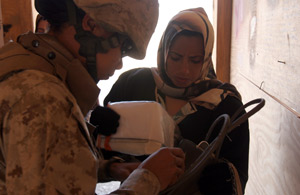AL QAIM, Iraq (Nov. 30, 2005) -- Construction of bases for the Iraqi Army and U.S. military’s long-term security presence is steadily progressing in Husaybah, Karabilah and Ubaydi. Simultaneously, Iraqi Army soldiers and Marines continue patrolling to ensure insurgents do not return. These patrols also involve detailed searches, looking for hidden weapons caches and deadly improvised explosive devices. Approximately 120 bombs and mines have been located over the course of Operation Steel Curtain.
Three aspects of the operation which makes Steel Curtain different from previous operations in the Western Euphrates River Valley are increased Iraqi Army participation, immediate establishment of long-term security presence, and Iraqi Army soldiers taking the lead in security and care of the citizens temporarily displaced by the operation.
Approximately 1,000 Iraqi Army soldiers took part in Operation Steel Curtain. During Operation Romhe (Spear), conducted in this same area last June, fewer than 100 Iraqi soldiers took part.
Today, more than 15,000 Iraqi Army soldiers are stationed in Al Anbar province and recently locally-recruited soldiers are joining and operating with Iraqi Army units and U.S. forces. The Desert Protectors, recruited from the Al Qa’im region, fought alongside Iraqi Army soldiers and Coalition forces in Operation Steel Curtain.
Three aspects of the operation which makes Steel Curtain different from previous operations in the Western Euphrates River Valley are increased Iraqi Army participation, immediate establishment of long-term security presence, and Iraqi Army soldiers taking the lead in security and care of the citizens temporarily displaced by the operation.
Approximately 1,000 Iraqi Army soldiers took part in Operation Steel Curtain. During Operation Romhe (Spear), conducted in this same area last June, fewer than 100 Iraqi soldiers took part.
Today, more than 15,000 Iraqi Army soldiers are stationed in Al Anbar province and recently locally-recruited soldiers are joining and operating with Iraqi Army units and U.S. forces. The Desert Protectors, recruited from the Al Qa’im region, fought alongside Iraqi Army soldiers and Coalition forces in Operation Steel Curtain.
